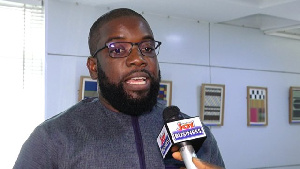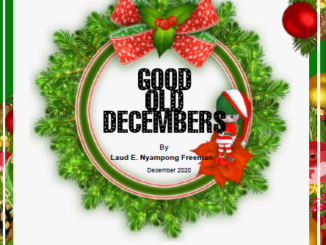Hidden in Plain Sight
Life is a kaleidoscope of many things – puzzles, paradoxes and perplexities included therein. The simple village farmer works the land in season, praying the rains will not fail. The farmer who prays and awaits Heaven to send down rains, same farmer dreads rains.
But it is not the heavy, boastful rains the village folk dreads. It is the slow, gentle showers – the ones that fall in malnourished droplets. They appear less than ordinary. They spend their showers with such frugality, so can live for hours – even days. They are not ushered in by strong winds. Oft-times, the sky does not darken prior. Their featherweight droplets are not interspersed with bolts of lightning. Men and animals do not run for cover – they barely regard such toothless showers.

Yet, these skinny droplets of water can be a village dweller’s nightmare. Silent as phantoms, they neither drum on nor ruffle the thatched roof of a village dweller’s dwelling. They silently seep into homes and barns of simple folks. The ground and the house of clay upon it swallow every droplet – like a drunkard with an undying thirst for liquor. Drib by drib, with neither haste nor force, the weakly showers gently work their way into the ground and into unprimed walls of a villager’s home.
Then comes the unsuspecting second – when Chinua Achebe comes to mind – when the earthen walls of a simple folk’s home cannot hold, and things fall apart. The walls of uncooked clay succumb to the subtle onslaught of the gentle showers, the roof caves in, and shelter for man and beast and grain is lost. A home is reduced to a pile of wet clay and sticks, capped with straw.
A simple description of village life and one of its fears, told yesteryear’s by a grandmother to her eleven-year-old grandson.Yaw Adu was audience; Maame Efua Akom, narrator. Yaw Adu has since grown. He is a geological engineer for a large mining company with footprints on three continents. It is the first Friday of the fifth month, and he is journeying homeward to family. For six years and a half, he has faithfully stuck to this pendulum shuttle, much to the admiration of many – aye, even the awe of some.
As he drives his dust-bathed truck out of the old mining town of Tarkwa enroute Takoradi, he sees village farmers yonder. Like hosts expecting an august visitor from far afield, they prepare their land to receive the rains. Yaw Adu remembers his beloved grandmother. She was his nurturer, inspirer and favourite storyteller. Twenty eight years have passed since she passed on, but past memories of her pass not. Only if she were here to see what her love moulded him into. In the blink of an eye, his eyes well up with tears. She taught him pure love and selfless service never end. Perhaps, she is busy nurturing others on the other side.
Yaw Adu begins to think about the simple workers on the field – his teary eyes firmly fixed on the dusty, familiar road as he navigates its serpentine course. Even so, memories of Maame Efua Akom still play on beneath the surface. He had driven past these simple folks many times. Sights of them had never provoked any special thoughts. At best, any thoughts of them had lasted only as long as they remained within his eyeshot.
READ MORE: Greeting the Toys – By Laud Freeman
This time, thoughts of the sweat-bathed farmers linger on even out of sight. He ponders longer about their drudgery – about their unspoken fears – about their expectations of Mother Nature– about the rain story of yesteryears. He reminisces his boyhood days when he played and danced in the rain – merrily and carefree. Those were heavy rains. But he had no memorable childhood encounters with light showers, save the memory of grandmother’s story.
Yaw continues his silent contemplations as he journeys home. Then it suddenly hits home – in grandmother’s rain story lie multiple layers of truth – a person, aye, a people must remain eternally vigilant when peace, freedom and liberty seem to prevail. It dawns on him that silence is not the absence of activity – verily, the witches of his mother’s village would agree with him on that. He understands that stillness is not the absence of motion. He discerns that peace is not the absence of threat –beneath a mountain covered in lush vegetation, bone-melting magma may silently brew.
Indeed, as a young boy, Yaw Adu had witnessed the sudden fall of a healthy-looking orange tree in their backyard. Its leaves were still green, with maturing fruits upon its branches. The tree did not slowly tilt from its upright position – it was not murdered by a strong man with a sharp axe. An army of small, silent white creatures had patiently eaten away the roots of the hardwood citrus tree. It took years before it bore its first fruits – but it fell in a single moment. They say coming events forecast their shadows but no one had seen the coming of the fall.
Yaw Adu had caught a glimpse into the deeper meaning of things. “There is more to simple-looking things than meets the beholding eye. Every simple thing in life teaches something deeper about life. This must have been grandma’s hidden message in the old rain story”, he silently tells himself. The flame of Truth had been lighted in his heart, and it would illuminate his path and lead him to discover the purpose of life. Once upon a time, on the rocky road to Damascus, a man had a life-changing encounter. Two thousand years on, across seven thousand nine hundred and fifty–three kilometres, on a dusty road to Takoradi, another man had had his epiphany moment.
So much for Yaw Adu. Now let us turn and face the mirror, for therein lies our collective image. As a nation, a continent – aye, even as a race, we becoming as a house of clay in grandmother’s story of yesteryears – as the orange tree in the backyard of the old house. Our tiny raindrops of indiscipline, corruption, collusion, dishonesty, avarice, malice, parochial partisan politics and a thousand other ills are falling, while the termites work silently from beneath. But as yet, all seems well on the surface. So we eat, make merry and talk, and justify wrong under the rubric of Law and Democracy and 21st century civilisation. Thus do we turn an unseeing eye and an unhearing ear to the festering ills. While we keep busy doing so, our naked walls are soaking up…our roots are being eaten up by silent devourers.
–
By: Laud E. Nyampong Freeman
The writer is a Communications, PR and Marketing Consultant with close to two decades of professional experience across several industries. He may be contacted on Tel: (GH) 0268811122 and Email: laudfreeman@gmail.com



